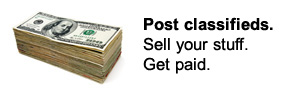Do eBooks Beat Paperbacks?
At the beginning of every semester, we hear all about the different alternatives we have when it comes to our textbooks. We can buy the hard copy, new or used. We can rent them, sometimes saving hundreds of dollars. And recently we’ve seen: “Get your books online, so you can use them wherever you go!” These versions of the books are extremely cheap, at least compared to buying a hard copy of the book. But soon you may find yourself asking a lot of questions: What is an eBook reader? What if I don’t have an eBook reader? Which eBook reader would I pick if I had to get one? What the heck is an eBook, anyway?
Let’s start with the last question.
There is no fancy code here. Just like how e-mail stands for electronic mail an eBook is just what it appears to be: an electronic book.
An eBook can be one of many different file types, ranging from Microsoft Office documents (*.doc) to electronic publications (*.epub) to a portable document format (*.pdf). You can view eBooks on any number of devices, like the iPhone, any phone running the Android Operating System and even your computer. However, many people prefer to read eBooks on a dedicated eBook reader.
The most commonly known eBook readers are the NOOK from Barnes & Noble and the Kindle from Amazon. Other options include the Sony Reader, the Pandigital Novel Digital Book and the ECTACO jetBook. These devices cost anywhere from $150 to $700. Some can do more than just display eBooks. They can access Facebook and Twitter. The jury is still out on whether these readers allow you to read productively.
Students and teachers alike agree on the different uses and applications of eBooks. Elizabeth Doyle, professor of geology at Annandale, says that eBooks are great for students taking literature classes, whereas a hard book is better for practical sciences. Part of this is due to a paper book being more durable than an eBook reader. If you drop a rock from your geology lab onto your NOOK, you can have fun trying to explain that to your teacher.
A very common question among students is: “What if it breaks?”
No one wants to spend $300 on a device that will break in a week. And if you are taking science classes, especially ones that have hands-on labs, this is a very real danger. Even putting your reader in your bag can scratch the screen, cause it to break from impact with your car door or even get stolen when you aren’t looking. That said, some think that the benefits outweigh the risk of damage or destruction.
The advantages of having an internet-enabled device to read your eBooks increase considering the number of books that can be downloaded for free, including books like Joseph Conrad’s Heart of Darkness, Jane Austen’s Pride and Prejudice and even many works from Shakespeare that are staples in literature classes.
Most eBook readers also come equipped with a dictionary and digital bookmarking software, allowing the reader to view whatever page they want instantly.
Many proponents of hard copy books cite durability, adaptability and singularity as the reasons to buy printed books. Drop a textbook, scratch the cover. But drop an eBook reader, and you could pay $300 for a new one, depending on the restrictions of the warranty and if the device is still covered. Also, if you lose your textbook, you do not have to buy all of your books again.
In the end, the argument of eBook versus hard copy boils down to one question: Which do you prefer? If you like the portability, convenience and versatility of an eBook reader and don’t mind the steep upfront cost of the device, get one. If you want to stick to your paper books, you should probably start going to the gym. Those things aren’t light.
By: Chris Pilcher
Stay updated by liking us on Facebook or following us on Twitter.













Leave your response!